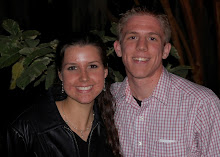For some reason, partial-birth abortions seem to many Christians to be more wrong than normal abortions. Our views, just as everyone else's, have been influenced by "abortion rights" activists. The truth is, it makes no difference whether the child is in the womb, outside the womb, or en route to the outside world. It is the curtailing of a life, no matter at what stage it is ended.
Once it is permissible to end a life inside of the womb, it becomes acceptable to end life outside of the womb, as this article shows. This article appeared in the "Health" section of The Australian.
Euthanase disabled babies, say doctors
November 6, 2006
LONDON: One of Britain's leading medical colleges is calling on the health profession to consider permitting the euthanasia of seriously disabled newborn babies.
The proposal by the Royal College of Obstetricians and Gynecology is a response to the number of such children surviving because of medical advances.The college is arguing that "active euthanasia" should be considered for the overall good of families, and to to spare parents the emotional burden and financial hardship of bringing up the hardest-hit babies.
"A very disabled child can mean a disabled family," the doctors say.
"If life-shortening and deliberate interventions to kill infants were available, they might have an impact on obstetric decision-making, even preventing some late abortions, as some parents would be more confident about continuing a pregnancy and taking a risk on outcome."
Geneticists and medical ethicists supported the proposal - as did the mother of a severely disabled child - but a prominent children's doctor described it as social engineering.
The college called for active euthanasia of newborns to be considered as part of an inquiry into the ethical issues raised by the policy of prolonging life in newborn babies. The inquiry is being carried out by the Nuffield Council on Bioethics.
The proposal does not spell out which conditions might justify euthanasia, but in The Netherlands mercy killing is permitted for babies with a range of incurable conditions, including severe spina bifida and the painful skin condition called epidermolysis bullosa.
Pieter Sauer, co-author of the Groningen Protocol, the Dutch national guidelines on euthanasia of newborns, claims British pediatricians unofficially perform mercy killings, and says the practice should be open.
"In England they have exactly the same type of patients as we have here," Dr Sauer said. "English neonatologists gave me the indication this is happening in their country."
Although euthanasia for severely handicapped newborn babies would be contentious, some British doctors and ethicists are now in favour.
The professor of human genetics at University College London, Joy Delhanty, said: "I would support these views. I think it is morally wrong to strive to keep alive babies that are then going to suffer many months or years of very ill health."
The college's submission was welcomed by John Harris, a member of the Government's Human Genetics Commission and professor of bioethics at Manchester University.
"We can terminate for serious fetal abnormality up to term but cannot kill a newborn," he said. "What do people think has happened in the passage down the birth canal to make it OK to kill the fetus at one end of the birth canal but not at the other?"
Edna Kennedy of Newcastle upon Tyne, whose son suffered epidermolysis bullosa, said: "In extremely controlled circumstances, where the baby is really suffering, it should be an option for the mother."
However, John Wyatt, consultant neonatologist at University College London hospital, said: "Intentional killing is not part of medical care."
The Sunday Times
One statement in this article is particularly chilling:
"We [currently] can terminate for serious fetal abnormality up to term but cannot kill a newborn," he said. "What do people think has happened in the passage down the birth canal to make it OK to kill the fetus at one end of the birth canal but not at the other?"What, indeed, has happened? Nothing. A child is a child inside the mother as well as outside. There is no magical transformation undergone by the child during birth. This is the moral dilemma faced by those who support abortion but oppose infanticide. You see, once abortion is accepted, infanticide logically follows. If it is acceptable to kill a child inside the womb, it is okay to kill it on the other side of the birth canal. Where do we draw the line? Some people contend that life does not begin until birth. Others claim that life begins in the third trimester. There are differing opinions held by men. But that is just what they are: man's opinions. What does God say about when life begins? Exodus 21:22-23 says,
If men strive, and hurt a woman with child, so that her fruit depart from her, and yet no mischief follow: he shall be surely punished, according as the woman's husband will lay upon him; and he shall pay as the judges determine. And if any mischief follow, then thou shalt give life for life.In other words, if a pregnant woman is hurt and she gives birth prematurely, but there is no injury (or mischief) done to the child, the offender will be punished in the way that the child's father dictates. However, if there is injury done - the child is born dead, or dies afterwards - "thou shalt give life for life." The child is therefore considered to be a life, just the same as his parents.
A life is a life, whether handicapped or not. The article states, in part,
The professor of human genetics at University College London, Joy Delhanty, said: "...I think it is morally wrong to strive to keep alive babies that are then going to suffer many months or years of very ill health."The fact that someone suffers pain does not make that person any less a person! And the fact that someone may be suffering does not give anyone the right, or the moral responsibility, to kill that person.
Abortion as it is known in the United States today began with making allowances for the health or life of the mother. If the child was a threat to the mother's health, it became okay to kill it. On average in America currently, well over three thousand unborn babies are killed each day. 93% of these abortions are obtained because of social reasons: the child is unwanted or inconvenient.* Looking at the scenario in this article, it is easy to see in what direction these countries, and eventually ours, are headed. First, we say that it is okay to kill a child if that child has the potential to experience "very ill health," or to burden the family with its handicaps. The next step is to legalize infanticide for social reasons: the child is unwanted or inconvenient.
At Vision Forum's Film Festival, one of the film submissions, titled The Choice, compellingly addressed the issue of at what stage it is okay to end a life.
This 25-minute, anti-abortion drama focuses on the reasoning commonly used to support abortion. Follow the emotion-wrought journey of one couple as they grapple with a monumental decision in their life ... do they want to be parents? This film pushes the issue to the limits of what abortion really is.In the film, the mother makes the common statement, "It's my choice. I have the right to choose," apparently referring to her right to have an abortion - to kill her child. All of the normal reasons that are given for abortions are used. It is only at the end of the film that we discover that the child who is going to be terminated is ten years old. "But I want to stay with you and Daddy," she pleads. The mother's response is very disturbing, but typical: "It is my choice." This powerful film ends with the parents walking out of the "clinic," leaving their daughter behind, exposing the horrors of abortion and also the direction in which our country is headed.
One reason, I believe, that abortions have become so accepted in our culture, is the choice of vocabulary. There is definitely a very strong agenda behind this. Calling the unborn baby a "fetus" desensitizes people to the actual status of that baby. As soon as the child is born, it qualifies to be called an infant, baby, child, person, boy, or girl. On the other side of the birth canal, it is termed a "fetus."
The phrase "the right to choose," and the term "pro-choice" clearly have an agenda behind them also. Of course we want to give a woman the right to choose! Don't we? It is very noble-sounding! Do we want to give murderers the right to choose, then, too? Do we want to give everyone the right to choose to do whatever they want? This slogan could be applied to any number of areas. A woman does not have a right to choose to kill someone - inside or outside of the womb. Pro-abortionists claim that a mother should have the right to control her own body. What they refuse to realize is that it is not just her body that is involved. It is someone else's body, someone else's life.
In The Australian article, several reasons are cited for the medical college's call for "active euthanasia." The Royal College of Obstetricians and Gynecology claims to be pushing euthanasia for "the overall good of families, and to to spare parents the emotional burden and financial hardship of bringing up the hardest-hit babies." "A very disabled child can mean a disabled family," the doctors say. Every baby affects a family in one way or another. Following this reasoning, anytime a child has the potential to cause an "emotion burden" or "financial hardship," it is alright to simply kill the child. Every child involves sacrifice on the part of the parents. Again, where do we draw the line? How much sacrifice is too much?
These doctors also claim that allowing the euthanasia of infants may "[prevent] some late abortions," and make parents "more confident about continuing a pregnancy." Basically, the doctors argue that the parents will be more willing to chance having a disabled baby, because if they see that the child is disabled, they can kill their baby. What is to keep on-demand infant euthanasia from become acceptable and legal? Once we start rolling down this slippery slope, where do we stop? Where is the bottom?
John Harris' statement is truly frightening.
"We can terminate for serious fetal abnormality up to term but cannot kill a newborn," he said. "What do people think has happened in the passage down the birth canal to make it OK to kill the fetus at one end of the birth canal but not at the other?"What, indeed, has happened?
Psalm 139:13-14 - For thou hast possessed my reins: thou hast covered me in my mother's womb. I will praise thee; for I am fearfully and wonderfully made: marvellous are thy works; and that my soul knoweth right well. My substance was not hid from thee, when I was made in secret, and curiously wrought in the lowest parts of the earth. Thine eyes did see my substance, yet being unperfect; and in thy book all my members were written, which in continuance were fashioned, when as yet there was none of them. How precious also are thy thoughts unto me, O God! how great is the sum of them!
my soon-to-be-born little brother or sister
*Statistics from the Center for Bio-Ethical Reform.




No comments:
Post a Comment